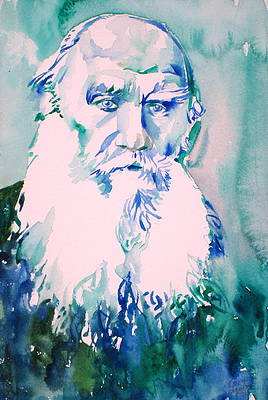Leo Tolstoy Archive
Written: 1887
Source: Original Text from Gutenberg.org
Transcription/Markup: Andy Carloff
Online Source: RevoltLib.com; 2021

We had now been marching more than two hours. I began to feel chilly, and to be overcome with drowsiness. In the darkness the same indistinct objects dimly appeared: at a little distance, the same black shadow, the same moving spots. Beside me was the crupper of a white horse, which switched his tail and swung his hind-legs in wide curves. I could see a back in a white Circassian shirt, against which was outlined a carbine in its black case, and the handle of a pistol in an embroidered holster: the glow of a cigarette casting a gleam on a reddish mustache, a fur collar, and a hand in a chamois-skin glove.
I leaned over my horse's neck, closed my eyes, and lost myself for a few minutes: then suddenly the regular hoof-beat[19] and rustling came into my consciousness again. I looked around, and it seemed to me as though I were standing still in one spot, and that the black shadow in front of me was moving down upon me; or else that the shadow stood still, and I was rapidly riding down upon it.
At one such moment I was more strongly than ever impressed by that incessantly approaching sound, the cause of which I could not fathom: it was the roar of water. We were passing though a deep gulch, and coming close to a mountain river, which at that season was in full flood.[20] The roaring became louder, the* damp grass grew taller and thicker, bushes were encountered in denser clumps, and the horizon narrowed itself down to closer limits. Now and then, in different places in the dark hollows of the mountains, bright fires flashed out and were immediately extinguished.
"Tell me, please, what are those fires," I asked in a whisper of the Tatar riding at my side.
"Don't you really know?" was his reply.
"No," said I.
"That is mountain straw tied to a pole,[21] and the light is waved."
"What for?"
"So that every man may know the Russian is coming. Now in the Auls," he added with a smile, "aï, aï the tomásha[22] are flying about; every sort of khurda-murda[23] will be hurried into the ravines."
"How do they know so soon in the mountains that the expedition is coming?" I asked.
"Eï! How can they help knowing? It's known everywhere: that's the kind of people we are."
"And so Shamyl is now getting ready to march out?" I asked.
"Yok (no)," he replied, shaking his head as a sign of negation, "Shamyl will not march out. Shamyl will send his naïbs[24] and he himself will look down from up yonder through his glass."
"But doesn't he live a long way off?"
*
"Not a long way off. Here, at your left, about ten versts he will be."
"How do you know that?" I inquired. "Have you been there?"
"I've been there. All of us in the mountains have."
"And you have seen Shamyl?"
"Pikh! Shamyl is not to be seen by us. A hundred, three hundred, a thousand murids[25] surround him. Shamyl will be in the midst of them," he said with an expression of fawning servility.
Looking up in the air, it was possible to make out that the sky which had become clear again was lighter in the east, and the Pleiades were sinking down into the horizon. But in the gulch through which we were passing, it was humid and dark.
Suddenly, a little in advance of us, from out the darkness flashed a number of lights; at the same instant, with a ping some bullets whizzed by, and from out the silence that surrounded us from afar arose the heavy, overmastering roar of the guns. This was the vanguard of the enemy's pickets. The Tatars, of which it was composed, set up their war-cry, shot at random, and fled in all directions.
Every thing became silent again. The general summoned his interpreter. The Tatar in a white Circassian dress hastened up to him, and the two held a rather long conversation in a sort of whisper and with many gestures.
"Colonel Khasánof! give orders to scatter the enemy," said the general in a low, deliberate, but distinct tone of voice.
*
The division went down to the river. The black mountains stood back from the pass; it was beginning to grow light. The arch of heaven, in which the pale, lusterless stars were barely visible, seemed to come closer; the dawn began to glow brightly in the east; a cool, penetrating breeze sprang up from the west, and a bright mist like steam arose from the foaming river.
[19] topot.
[20] In the Caucasus the freshets take place in the mouth of July.
[21] tayak in the Caucasian dialect.
[22] tomásha means slaves in the ordinary dialect invented for intercourse between Russians and Tatars. There are many words in this strange dialect, the roots of which are not to be found either in Russian or Tatar.—AUTHOR'S NOTE.
[23] Goods and chattels in the same dialect.
[24] naïb ordinarily means a Mohammedan judge or high religious officer, in Turkey and the Caucasus; hero it means an officer whom the great Circassian chieftain Shamyl endowed with special authority.
[25] The word murid has many significations, but in the sense here employed it means something between adjutant and bodyguard.—AUTHOR'S NOTE.